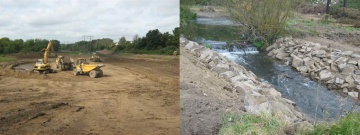Case study:Tolka Valley Park erosion control: Difference between revisions
No edit summary |
No edit summary |
||
| Line 5: | Line 5: | ||
{{Project overview | {{Project overview | ||
|Status=Complete | |Status=Complete | ||
|Project web site url=riverwiki.restorerivers.eu/wiki/index.php?title=Case_study%3ATolka_Valley_Park_erosion_control | |||
|Themes=Habitat and biodiversity, Monitoring, Social benefits | |Themes=Habitat and biodiversity, Monitoring, Social benefits | ||
|Country=Ireland | |Country=Ireland | ||
Revision as of 10:14, 2 August 2013
This case study is pending approval by a RiverWiki administrator.
Project overview
| Status | Complete |
|---|---|
| Project web site | http://riverwiki.restorerivers.eu/wiki/index.php?title=Case_study%3ATolka_Valley_Park_erosion_control |
| Themes | Habitat and biodiversity, Monitoring, Social benefits |
| Country | Ireland |
| Main contact forename | Maryann |
| Main contact surname | Harrie |
| Main contact user ID | |
| Contact organisation | Dublin City Council |
| Contact organisation web site | http://www.dublincity.ie |
| Partner organisations | |
| This is a parent project encompassing the following projects |
Project summary
The improvement of the Tolka Valley Park by Dublin City Council along the River Tolka created opportunity to pilot a new piloted approach under Renew4GPP, which is an EU LIFE Project (LIFE09 ENV/BE/000406).
The project aimed to enhance green space in an urban area by demonstrating to local authorities the ecological advantages to prevent erosion using high-quality and 100% biodegradable matting materials. This project also targeted existing fisheries to be improved with an increase of people engagement and the support from the Inland Fisheries Ireland and the Tolka Trout Anglers Association.
This piloted matting approach uses biodegradable weed control matting to be installed in areas of exposed soil. The site is being monitored by the Parks and Landscape Services Division to assess the effectiveness of the matting approach. First results indicate that it is preventing soil loss during flooding, resisting burning and reducing maintenance requirements.
Monitoring surveys and results
Lessons learnt
Catchment and subcatchment
Site
| Name | |
|---|---|
| WFD water body codes | |
| WFD (national) typology | |
| WFD water body name | |
| Pre-project morphology | |
| Reference morphology | |
| Desired post project morphology | |
| Heavily modified water body | No |
| National/international site designation | EU - Special Area of Conservation |
| Local/regional site designations | |
| Protected species present | Yes |
| Invasive species present | No |
| Species of interest | Otter (Lutra lutra), Atlantic salmon (Salmo salar), kingfisher (Alcedo atthis), Bats (4 spp.), Trout |
| Dominant hydrology | |
| Dominant substrate | |
| River corridor land use | |
| Average bankfull channel width category | |
| Average bankfull channel width (m) | |
| Average bankfull channel depth category | |
| Average bankfull channel depth (m) | |
| Mean discharge category | |
| Mean annual discharge (m3/s) | |
| Average channel gradient category | |
| Average channel gradient | |
| Average unit stream power (W/m2) |
Project background
| Reach length directly affected (m) | |
|---|---|
| Project started | |
| Works started | |
| Works completed | |
| Project completed | |
| Total cost category | |
| Total cost (k€) | |
| Benefit to cost ratio | |
| Funding sources |
Cost for project phases
| Phase | cost category | cost exact (k€) | Lead organisation | Contact forename | Contact surname |
|---|---|---|---|---|---|
| Investigation and design | |||||
| Stakeholder engagement and communication | |||||
| Works and works supervision | |||||
| Post-project management and maintenance | |||||
| Monitoring |
Reasons for river restoration
| Mitigation of a pressure | |
|---|---|
| Hydromorphology | |
| Biology | |
| Physico-chemical | |
| Other reasons for the project |
Measures
Structural measures
| |
|---|---|
| Bank/bed modifications | New bioengineering elements in order to improve banks |
| Floodplain / River corridor | |
| Planform / Channel pattern | |
| Other | |
Non-structural measures
| |
| Management interventions | |
| Social measures (incl. engagement) | |
| Other | |
Monitoring
Hydromorphological quality elements
| Element | When monitored | Type of monitoring | Control site used | Result | ||
|---|---|---|---|---|---|---|
| Before measures | After measures | Qualitative | Quantitative | |||
Biological quality elements
| Element | When monitored | Type of monitoring | Control site used | Result | ||
|---|---|---|---|---|---|---|
| Before measures | After measures | Qualitative | Quantitative | |||
Physico-chemical quality elements
| Element | When monitored | Type of monitoring | Control site used | Result | ||
|---|---|---|---|---|---|---|
| Before measures | After measures | Qualitative | Quantitative | |||
Any other monitoring, e.g. social, economic
| Element | When monitored | Type of monitoring | Control site used | Result | ||
|---|---|---|---|---|---|---|
| Before measures | After measures | Qualitative | Quantitative | |||
Monitoring documents
Image gallery
Additional documents and videos
Additional links and references
Supplementary Information
Edit Supplementary Information


